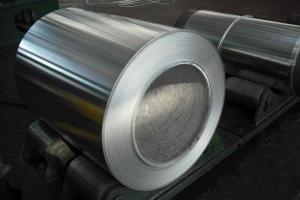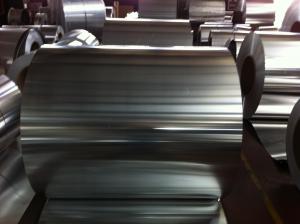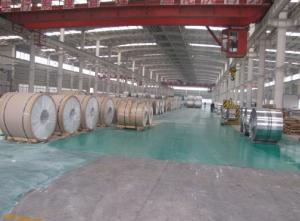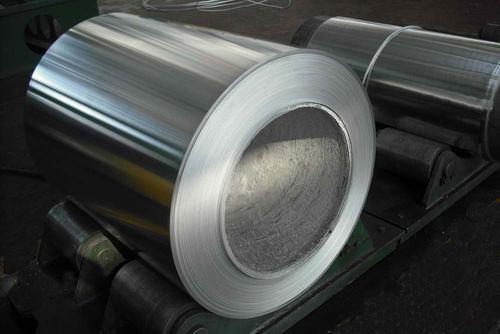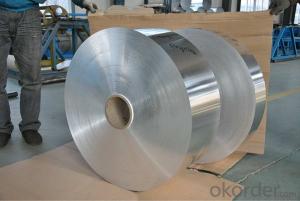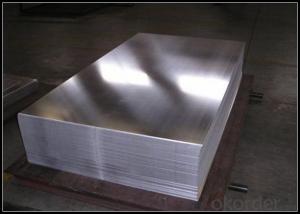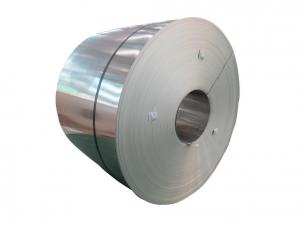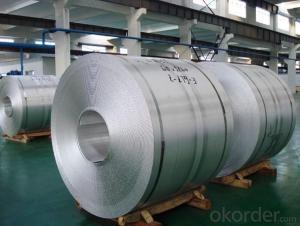5083 Aluminum Coils Wholesale - Continuous Casting Aluminium Coils for Building AA1050
- Loading Port:
- China Main Port
- Payment Terms:
- TT or LC
- Min Order Qty:
- -
- Supply Capability:
- -
OKorder Service Pledge
OKorder Financial Service
You Might Also Like
1.Structure of Product Description
Continuous Casting Aluminium Coils are one semi-finished aluminium material. This strip can be rolled down to aluminium coil,sheet,circle ect. The alloy AA1050 is widly used in building, industry ect. Its weight is much lower than steel. So many customers choosed aluminium material instead of steel. Moreover, the aluminium will not have rust, compared with steel products.
2. Main features of the product
a.Competitive price---We have our own mills and can produce mill finished aluminium coils, so we can control the production cost better.
b.Professional after-sale service---We have more than 15 years exportation experience and you need not worry about the exporation problems.
c.Fast delivery time---We can control the delivery time within 35 days.
3. Image
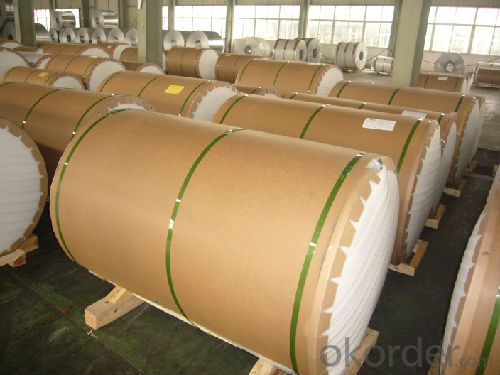
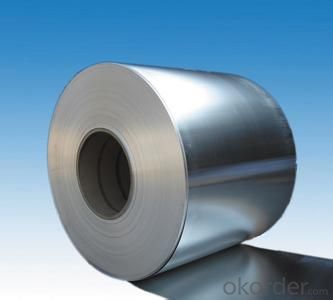
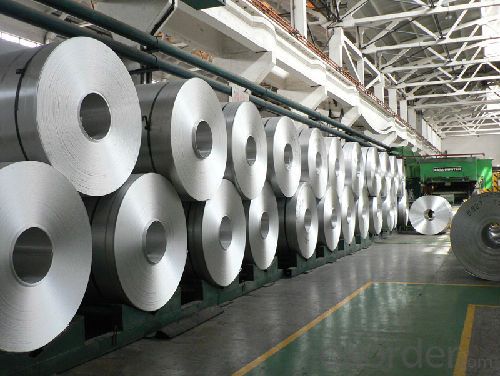
4.Products Specification
| Alloy | Temper | Thickness | Coil ID | Coil Weight |
| AA1050 | F | 3mm-5mm | 610mm+/-10mm | 5-6 tons |
5. FAQ:
What is the quality standard?
---Usually our standard is GB3880-2006
What is the largest width?
---It is 2300mm
What is the MOQ?
---Usually we can accept 80 tons.
- Q: What are the transportation and storage requirements for aluminum coils?
- There are several factors that determine the transportation and storage requirements for aluminum coils. Firstly, it is crucial to handle the coils with caution during transportation in order to avoid any harm. Secure packaging is necessary to prevent potential scratches, dents, or deformation. Additionally, safeguarding the coils from moisture is essential as exposure to water or high levels of humidity can result in corrosion. During transportation, it is advisable to employ appropriate vehicles or containers that can sufficiently support the weight and dimensions of the aluminum coils. The coils should be firmly secured to prevent any movement or shifting that may cause damage. Regarding storage, it is of utmost importance to store aluminum coils in an area that is clean, dry, and well-ventilated. Ideally, the storage facility should maintain a stable temperature and humidity level to prevent any negative effects on the coils. If the coils are stored outside, they should be adequately covered and protected from direct sunlight, rain, and other weather conditions. Furthermore, it is crucial to store aluminum coils away from any substances or chemicals that may cause damage. They should be stored in a manner that prevents contact with other materials, as physical contact can lead to scratching or other types of damage. In summary, the transportation and storage requirements for aluminum coils involve careful handling, protection from moisture and corrosive materials, proper packaging and securing during transportation, and storage in a clean and suitable environment. By adhering to these guidelines, the integrity of the aluminum coils can be preserved, ensuring their quality and usability.
- Q: Are there any specific regulations for the disposal of aluminum coil waste?
- Yes, there are specific regulations for the disposal of aluminum coil waste. It is important to adhere to local environmental laws and regulations, which typically require proper handling, storage, and disposal methods for aluminum coil waste. This may include recycling or sending the waste to licensed facilities for proper treatment and disposal. It is recommended to consult with local authorities or waste management agencies for specific guidelines and requirements.
- Q: How do aluminum coils contribute to architectural design flexibility?
- Aluminum coils contribute significantly to architectural design flexibility due to their unique properties and versatility. Firstly, aluminum coils are lightweight, which makes them easier to handle and install compared to other materials like steel or concrete. This characteristic allows architects to explore more creative and innovative designs without worrying about the weight limitations. It also enables the construction of large and complex structures, providing architects with greater freedom in their designs. Secondly, aluminum coils offer a wide range of surface finishes and colors. They can be painted, anodized, or coated with various materials, allowing architects to achieve desired aesthetic effects and match the building's appearance with its surroundings or the intended architectural style. This wide range of finishes enables architects to experiment with different visual effects, textures, and patterns, thereby enhancing the overall design flexibility. Furthermore, aluminum coils possess excellent corrosion resistance properties. This durability ensures that the architectural elements made from aluminum coils can withstand harsh weather conditions, such as rain, snow, or UV radiation, without deteriorating over time. This enhanced lifespan and low maintenance requirement make aluminum coils an attractive choice for architects seeking long-lasting and sustainable design solutions. Additionally, aluminum coils can be easily formed, bent, or shaped into various profiles and dimensions. This malleability allows architects to create customized architectural elements that fit specific design requirements, such as curved facades, intricate detailing, or irregular shapes. The ability to shape aluminum coils according to the architects' vision enables the realization of unique and distinctive designs that stand out in the architectural landscape. Lastly, aluminum coils are recyclable and environmentally friendly. The use of aluminum in architectural design aligns with sustainable practices, as it can be recycled repeatedly without losing its properties. This aspect appeals to architects and clients who prioritize eco-friendly design solutions and wish to reduce their carbon footprint. In conclusion, aluminum coils contribute significantly to architectural design flexibility by offering lightweight construction, a wide range of surface finishes, excellent corrosion resistance, malleability, and recyclability. These characteristics empower architects to push the boundaries of design, create visually stunning structures, and deliver sustainable and long-lasting architectural solutions.
- Q: Are there any restrictions on the coil length of aluminum coils?
- Yes, there are restrictions on the coil length of aluminum coils. The coil length is limited by factors such as the manufacturing process, transportation constraints, and handling capabilities. These restrictions ensure that the coils can be efficiently produced, transported, and utilized in various applications.
- Q: Can aluminum coils be used in food processing equipment?
- Yes, aluminum coils can be used in food processing equipment. Aluminum is a widely used material in the food industry due to its excellent heat conductivity, corrosion resistance, and lightweight properties. It is commonly used in food processing equipment such as refrigerators, ovens, and heat exchangers.
- Q: What is the impact of alloy purity on the performance of aluminum coils?
- The impact of alloy purity on the performance of aluminum coils is significant. Higher alloy purity leads to improved conductivity, strength, and corrosion resistance of the coils. It also enhances the overall efficiency and longevity of the coils. Conversely, lower alloy purity may result in reduced performance, lower conductivity, and increased susceptibility to corrosion. Therefore, ensuring high alloy purity is crucial for maximizing the performance and durability of aluminum coils.
- Q: I want to roll aluminum rolls and operate the machine for more than three years
- According to the "Regulations" the relevant provisions of the labor insurance ability of the level of disability identification to enjoy treatment of inductrial injury: (1) medical expenses by the unit in full advance;
- Q: Some manufactures (Kia, Hundai) use Iron blockswhileOther manufactures (Nissan, Chevy, ect.) use Aluminum blocks*****Is the point of using Iron blocks to increase long-term durability or temperature endurance??ORIs the use of Iron blocks simply an older, simpler technology (as compared to using Aluminum), the manufacture of which costs less money??And you would think that Aluminum weight savings would transer to better MPG, but the Kia gets very comparable mileage anyway.Thank you
- Aluminum's main advantages are weight and increased mpg for CAFE regulations. If you are going to keep your car to 150,000 miles eitheir block material will do. But if you are going to keep it 300,000 to the bitter, bitter end, you are better off with iron.
- Q: I need to write as many interesting facts as i can about aluminum for a thing for school, any help?
- HERE'S ONE (very very late -- ) The point, APEX, Capstone of the Washington Monument was made of Aluminum!
- Q: Can aluminum coils be painted or coated?
- Absolutely! It is entirely possible to paint or apply a coating to aluminum coils. Aluminum, being a remarkably adaptable material, can be adorned with a diverse range of finishes to elevate its aesthetic appeal and safeguard it against corrosion. The typical procedure for painting or coating aluminum coils entails cleansing and prepping the surface, administering a primer, and subsequently applying the desired paint or coating. The selection of paint or coating relies on the desired outcome and the specific purpose of the aluminum coil.
Send your message to us
5083 Aluminum Coils Wholesale - Continuous Casting Aluminium Coils for Building AA1050
- Loading Port:
- China Main Port
- Payment Terms:
- TT or LC
- Min Order Qty:
- -
- Supply Capability:
- -
OKorder Service Pledge
OKorder Financial Service
Similar products
Hot products
Hot Searches
Related keywords
